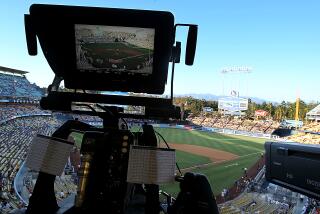For Dodgers and MLB, the billion-dollar TV question

For the vast majority of Dodgers fans, the mystery about the team’s television future is over. The broadcasts will move from Fox Sports to Time Warner Cable come 2014, the Dodgers could make $7 billion to $8 billion, and pitchers and catchers report to spring training in little more than two weeks.
In the ownership circles of Major League Baseball, however, a critical drama surrounding the Dodgers’ television future is playing out behind closed doors. The Dodgers and Time Warner Cable have deferred an announcement of the deal while the team and the league discuss how much revenue from the new contract should be diverted to other clubs.
At stake: More than $1 billion, and the possibility of a strained relationship between some owners and the office of the commissioner.
Under MLB rules, teams must contribute 34% of local television revenue to a pool designed to help small-market clubs. This year, the final season of the Dodgers’ current television contract, Fox Sports will pay the Dodgers a $39-million broadcast rights fee. In turn, the team will pay MLB $13 million to satisfy its revenue-sharing obligation.
As teams have moved from selling their television rights to launching their own television channels, MLB has adjusted its rules. If a team assumes the risk of ownership in a television channel, the team can keep all the revenue. However, MLB can determine what a fair-market broadcast rights fee would be and can assess the team 34% of that amount for the purpose of revenue sharing. In theory, whether the New York Yankees accept an annual rights fee or run their own network, the Kansas City Royals still can get a fair share of the Yankees’ TV money.
As The Times first reported last May, as part of the U.S. Bankruptcy Court settlement between MLB and former owner Frank McCourt, the league agreed that fair-market value for the Dodgers’ television rights would be $84 million per year, plus an annual increase of 4%. Yet those figures came from a proposed 2011 contract between Fox and McCourt that Commissioner Bud Selig rejected in part because he said the Dodgers “would likely be able to command better terms” by waiting.
If the Time Warner Cable deal provides the Dodgers with $7 billion over 25 years, that is an average of $280 million per year. That would appear to demonstrate that the fair-market value of the Dodgers’ television rights is far more than $84 million per year, but MLB is bound by the terms of the bankruptcy settlement.
Under the Time Warner Cable deal, the Dodgers would own a channel outright, with TWC handling distribution and administration. The contract has not been disclosed publicly, but The Times learned that TWC had guaranteed the Dodgers cable and satellite fees even from cable and satellite operators that do not carry the channel.
For the owner of a sports cable channel, the two primary sources of revenue are subscription fees and advertising. That raises at least one question for the MLB review of the Dodgers’ deal: If the subscription fees are guaranteed, just how much risk of ownership is the team taking?
For the Dodgers, the difference between paying 34% on the fair-market value in the bankruptcy settlement and paying 34% on the entire TWC deal is well over $1 billion. However, the settlement also enables the Dodgers to appeal any MLB assessment to the court.
The Dodgers appear willing to pay a little more than the minimum mandated by the settlement -- but not much more, since the club believes it has structured the TWC contract in accordance with MLB rules on team-owned channels. If the league disagrees, the Dodgers and MLB could return to Delaware for another contentious round in court.
The commissioner’s office has consistently told owners that, in regard to television revenue, the Dodgers would be treated the same as any other club. If the Dodgers keep $1 billion that other owners might have expected to get a share of, the discontent from those owners already grumbling about how Selig handled the McCourt exit might stir anew.
ALSO:
Dodgers and Sandy Koufax team up again after years apart
Dodgers invite Fox Sports to take lesser television role
Could Dodgers do deals with Fox and Time Warner?
More to Read
Are you a true-blue fan?
Get our Dodgers Dugout newsletter for insights, news and much more.
You may occasionally receive promotional content from the Los Angeles Times.







